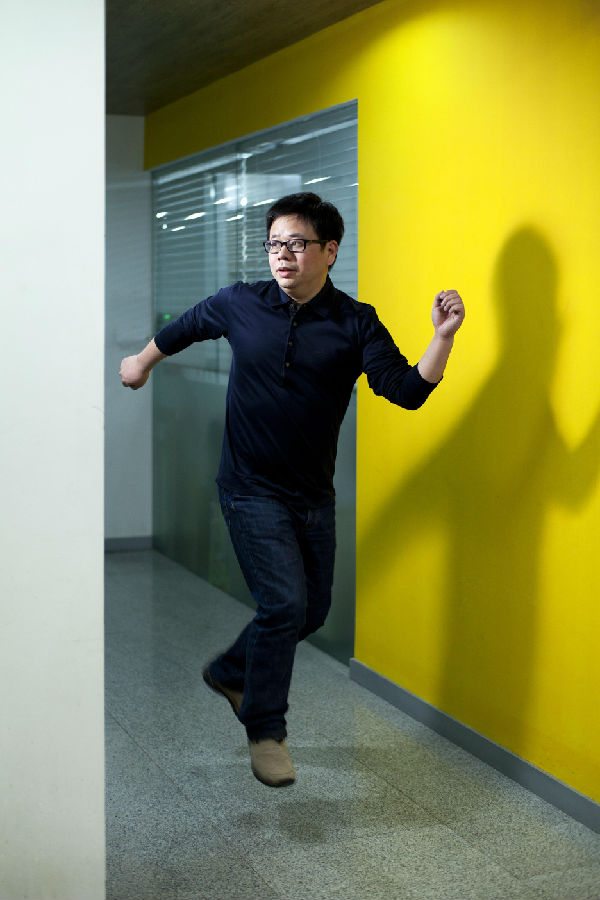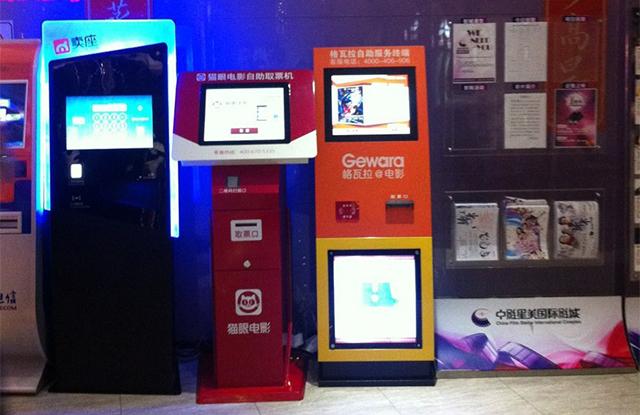
The boom in China’s box office is mainly attributed to the growth in the number of modern multiplexes catering to a growing middle class. Yet an equally important role has been played by convenience of mobile ticketing, which enables flexibility, impulse buying and seat selection that is valued by the 80, 90 and 00 generations (i.e. born in those decades), who are the main drivers of China’s cinema growth.
Just how big this is and how fast the trend is growing was highlighted in an article by Chinese entertainment consulting firm Entgroup last month:
During this year’s summer profile, market share of online ticketing business accounted for more than 30%. As of the third quarter, the total box office mainland film market beyond 2013 full-year results of 21.7 billion, is expected to reach 30 billion annual box office revenue, and online ticketing service will reach 50%, micro-channel movie tickets will use its unique “ripple communication “vibration entire online ticketing market, and root out the 3-4 line market, in response to consolidation and mergers and acquisitions in the context of the total forest hot market making the message is “no one can integrate me, I do not accept integration. “
Financial website Tiger Sniffing Network (!) profiles the rapidly evolving market and interviews people from three of the leading Mainland mobile ticketing providers: Pull Movies founder Kai, a Cat Movie insiders (interviewed anonymously) and Micro-Channel Movie Tickets founder Lin Ning.
Mobile ticketing in China is considered an O2O (Online-to-Offline) business, which is described by Wikipedia (Chinese) in the following terms:
O2O (Online To Offline) mode, also known as the offline business model refers to the purchase of consumer online marketing online and offline operations driving under the wire. O2O through promotions, discounts, information, service book, etc., the next line of the message store pushed to Internet users, which will convert them to customers under their own line, which is particularly suitable for the goods and services necessary to store the consumer, such as dining, fitness, movies and shows, beauty salons, and department stores such as photography.
In understanding Chinese consumers, particularly 80/90/00, it is important to appreciate the mobile-first, as well as savvy bargain, discount and special deals mentality that underpins consumer behaviour.
Added to this there is a strong element of social networking, using WeChat (messaging), Weibo (Twitter-type ‘micro-blog’) and other social apps, whereby peer influences and decision guided purchasing decisions for both goods and services/experiences.
Mobile Enablers Create Win-Win Situation
The article begins by pointing out that mobile movie ticketing vendors are in a unique position in terms of being enablers, rather than just middle-men between cinemas and their potential audience.
Online seat selection is typical of the O2O industry, where they provide cash flow from online and complete the import line. A mobile phone app will be able to direct the attention of online marketing to generate transformed into the purchasing power of the line at the box office, it is probable that all the movie marketing companies currently can not match the “creativity.” They are closer to the audience than the cinema, so they have amazing box office pulling power to entice the film side more and more to cooperate with them.
There is thus a power that rests with mobile movie ticket companies that is stronger than in most other parts of the world. This change has not come about overnight and the article does a good job of providing a chronology of how ticketing software systems have evolved in China over the past two decades.
Notable developments include:
1994 – Liberalisation of Hollywood film imports begin, requiring greater accountability for box office splits;
1995 – China Research Institute of Film and Film Company launches the research project “Computer Ticket Management Software “;
1996 – The “Tornado” computer cinema theater ticket management software trial is launched;
1998 – The second generation of theater ticket management system computer software, dubbed “Flamingo”, is born;
1999 – The National Theatre Conference computer ticketing system, developed with the aim of deployment at the end of 2000 to be installed with more than 300 cinema ticketing computer management systems in place;
2000 to 2003 – Over four years China has 1,068 theaters to install and use a different version of the computer ticketing system.
For the central government, implementing a reliable software ticketing system meant being able to clamp down on tax evasion as well as gaging a better view on actual box office numbers. This put cinemas ahead of many other service industries where true numbers were ‘concealed’ from official count, as the article notes.
Despite the early “distribution network” is not completely cure evasion concealed box office, but compared with other service industries, cinema industry informatization construction after two decades of accumulation and iteration, has enough lead, and this just is online seat selection platform to quickly access large technical prerequisites theater. You can not imagine, O2O players how to quickly and efficiently access a wide range of the country millions of different magnitude catering business cash register system. And over the past decade due to the rapid development of the Chinese film industry, standardization, scale theater has a very high degree, online seat selection and asset providers once linked companies or movie theaters CIC contract that can scale to promote market coverage.
Yet for consumers, the most important development cam not just in better pricing from Groupon-style competition between different operators, but also the move from online cinema ticket sales to online seat selection. This meant that Chinese cinema goers no longer had to buy their tickets “blind”, i.e. without knowing where in the auditorium they would be sitting.
[Micro-Channel Movie Tickets founder] Lin Ning believes that the reason for this year’s industry blowout, one reason is that the mobile Internet has penetrated into all of the time and space for user. The user can be completed online for any in consumer behavior have emphasized efficiency, but only for the buy online seat selection Times “blind selection.” With great technological advancement, but also shortens the entire process of buying a movie ticket, the user experience has been a qualitative leap. In addition, the theater is concerned, because the online seat selection, and compared to earlier buy attracted massive disorderly passenger, and now not only able to help shape the theater reasonable and orderly introduction of online traffic, but also through the Internet technology and leveraging online tools can also solve theater seating, “inventory”, which effectively improve the off-season schedule or weekday daytime and late-night theater attendance. By Lin Ning’s words, “cinema operator attendance is run, they want to be filled.”
Online and mobile cinema tickets is thus a win-win for cinemas and consumers, with the former less likely to be left with un-sold inventory (empty seats) and the latter having greater flexibility and transparency in buying a cinema experience.
“Difficult to distinguish friend and foe – online seat selection of new players”
Yet if mobile online ticketing is such a powerful, not to say lucrative, enabling platform, the question arises why the cinemas themselves or the distributors have not launched this either on their own or in partnerships.
The answer is that with the exception of a few large exhibitor players, the market has been too fragmented, with too little leverage both upstream and downstream.
While the import of Hollywood films is tightly controlled and the censors have a strong say over what is and is not allowed to be shown on Chinese screens, once a film is cleared for screening it is a very messy free-for-all and de-regulated market.
The interviews in the article makes that abundantly clear.
Online seat selection crashing is another important reason for the rise of the Chinese film industry’s own “decentralized” – the large number of front-end of the production company, and with the “national team” in the distribution end of the gradual loss of a strong position, private distribution companies in theaters the theater also limited by the terms of the control of capital strength and difficult to “take advantage”, so the whole front end of the six major Hollywood studios rarely has the same issue with a strong control of the big players. The show is also true back-end part of the country where more than 30 theater companies created mixed, too scattered situation, with only a few players such as Wanda Cinema or UME shadow CIC have strong assets linked the big players that have the potential to become a giant.
Kai believes that when the online seat selection Internet players cut to join the distribution and exhibition of the middle of the market, because the upstream and downstream ends of the bargaining power is too weak dispersion of lead, giving mobile ticket operators the Cat, Including Movies, Pull The Film, Micro-Channel Movie Tickets Online seat selection a greater voice.
But the power that the mobile ticket vendors wield also became apparent recently with regards to Cat Movies which pre-sold a large number of seats for the film “Heart Flower Road” but were said to be withholding payments, after which the article notes “the traditional film distribution company felt the chill.”
The person from Cat Movies interviewed anonymously (perhaps partly due to the fall out resulting from this) defended the company, saying that “We bring to the industry and more incremental upgrade; we cannot be said to be subversive or destructive.”
The argument is that allowing for pre-sales gives theatres a stronger position to plan and optimise the film booking. It also potentially puts Big Data (the buzz word de-jour) in the hands of cinema managers, which can be used in a variety of areas beyond just seat and screen selection.
The article makes clear that power has shifted to the consumers but that cinemas can benefit as well in this new scenario.
Lin Ning is also a deep experience of this, “the film side goal is to be better at the box office, the first thing is to wait a good theater managers, theater managers can now rely on the data that is to (pre) for data, so that in fact has changed the rules of the game.”
Followed by big data. Cat said: “We can according to some behavioral habits of users to do some more marketing and other topics, and incremental specific trigger some action down again subdivided, each class of users like what type of movie, like at what time. Section to see more focus on what position (seat), which can be tapped by the data. After the realization of this function can be applied to many aspects of the industry. ”
Online seat selection does not so much seek to change makers in the industry, as it is the user who change the industry, Lin Ning said: “The mobile Internet has changed people’s lives . The way [is not to try] to change people’s behavior because people have been changed, so the industry must accept the changes. “
The benefits of such Big Data will only become apparent to cinemas over time as they can adjust booking patterns, programming, price and seat offerings, not to mention promotions, marketing and even concessions to capture emerging consumption trends.
But the article acknowledges that this step-change is “subversive” and will require a shift in the current exhibition industry attitude.
Cheap Tickets Are Like a “Drug”
The greater danger highlighted by the interview with Ling is the creation of a permanent expectations consumers of cheap cinema tickets. This has already ben demonstrated in the US with the collapse in the share value of Groupon and similar bulk-buying operations.
Yet in China such a reality check is yet to come for mobile movie ticket operators. That does not mean that they are not aware of the potential danger. As Lin Ning states, “cheap is like a drug, the drug itself is cool, but there will be harm (to the industry), and the damage will be lasting.”
But Lin Ning also points that they can increasingly predict the likely success or failure a film will be at the box office and that this help in terms of cinemas making programming decisions. For “Brotherhood of the Blades” they were able to predict that it would generate “high heat” at the box office. Similarly, the surprise hit that was the re-release of the 10-year old Hong Kong film “Journey to the West” was a success that his company could predict early on.
Wanda Seeks Consolidation
Yet major exhibitors lead by Wanda are now trying to consolidate and streamline the proliferation of not just mobile movie ticket vendors but also the situation with multiplexes having as many as ten different machines dispensing the tickets bough online.
Wanda Cinema has unified the various online seat selection’s a ticket machine, that whether you are a Micro-Channel Cat Movies or Movie Tickets, or Pull The Film, as long as access to Wanda Cinema platform online seat selection, movie tickets have to be sold through their own terminal equipment Wanda Cinema ticket.
Wanda Cinema’s online seat selection “Merge”, also shows that a large cinema companies for membership / user data importance – not only should not interfere with my membership system, but also to put your data on their platform precipitation, for their own use, mining and create value.
But Wanda is one of a few, most of the domestic cinema has long despite its own membership system, but did not have enough technical ability and thinking of ways to structure these membership data, of course, unable to tap its value and create new value – – the value of customer data in the Internet age is self-evident.
Yet even Wanda, as the largest exhibitor operation in Mainland China, still only represents under 15% of box office, so the fragmentation of the market means that there is still plenty to play for by mobile movie ticket vendors.
What the Future Holds
This opportunity means that there is plenty of developments in the pipeline for the various operators, who see their platforms evolving significantly.
Kai’s Pull The Film has been aimed at the cinema this pain point – lean operations, this is the theater manager welcomed value creation. Pull the film is currently in development of a smart ticketing system platform called CIAS according Kai introduction, can be implemented as do lean theater through dynamic marketing services revenue management and pricing, membership management, thus helping achieve the cinema and theater profit maximization.
In addition, Kai also envisaged able to Priceline American model (ie, “name your own price” bid user initiated by the customer for the off-season schedule of the auction of goods, so as to promote the sale of goods) applied to the theater of operation, “Priceline in the United States very successful, its principle of operation theater can be used to improve the off-season schedule or deserted theater attendance streak with price leverage. The theater attendance increase during the day, the theater will be very welcome. “
Lin Ning also predicts that the mobile movie ticket industry is likely to consolidate in the future on China to just two or three major players (similarly to the US). Even so, there is a message that ends the article for the industry to embrace this change – or get left behind.
Their war has fully started, and the battlefield is the site of the traditional filmmakers. One interviewer with words to the end of the article – it is impossible to wait for the Internet company’s tradition, those waiting will die, so will become increasingly fast. Internet development in three decades, I believe many people have seen this trend, traditional enterprises should take the initiative to accelerate their pace. Traditional enterprises have their own advantages, many technologies, from talent to model, are very open, traditional enterprises should learn to take advantage of this.
The Chinese consumers love affair with both their smartphone and their cinema going is not about to end anytime soon. Those businesses that are best at bridging the gap between these two markets stand to benefit the most.



